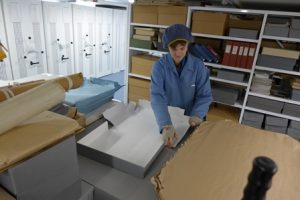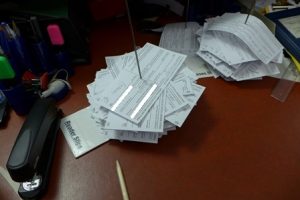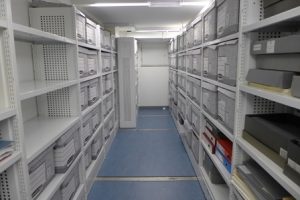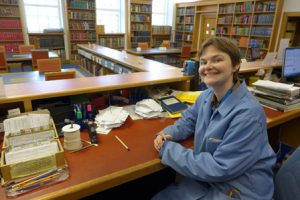A day in the life of an Archives Trainee
Being an Archives Trainee at Cambridge University Library is a unique experience. From battling boxes in the stacks, donned in winter woollies (it can be pretty chilly) and a fetching powder-blue lab coat (and dusty), to rifling through photograph albums from the Cambridge Footlights archives, no two days are quite the same.
Archive traineeships, which are run by several archives and record offices around the country, are designed to provide a year’s worth of paid experience for graduates looking to enrol for a post-graduate qualification in Archives Administration. As such, my work consists of a wide range of experiences, including one day a fortnight undertaking records management activities under the guidance of the University Compliance Office in the offices of the central administration, the Old Schools. Records management differs from archiving in that it also deals with the handling of ‘live’ material, i.e. files that are still in use, as opposed to wholly ‘dead’ files that are kept for historical posterity, as is the case with archives.
As I pass the six month mark of my time here (and in response to enquiries from several friends who hadn’t heard much of archives before), it seems a fitting time to give an impression of what, exactly, I do during a normal day in the University Library.
8.50am: Bleary bright-eyed, I enter the Library, stash my things in my locker, and go up to the Manuscripts Reading Room. Every morning I spend half an hour checking all of our reserved manuscripts and archives for any that have gone over the five day reservation period and returning them to their normal shelves, ‘spiking’ reservation slips as I go. I also occasionally fetch material for readers, if there’s a shortage of slips to stab, but there usually isn’t!
9.20am: Fetch my bag from my locker and make my way up to the fourth floor, home to the University Archives office. From now until coffee time I usually answer University Archives enquiries, of which we receive about 20 a week. I usually spend my time on those relating to the relatives of enquirers or people of note believed to have attended Cambridge, but occasionally the questions are more complex; recently I spent an afternoon searching through the Cambridge Footlights archives for material relating to the late playwright, Peter Shaffer.
10.10am: At around this time the first caffeine craving of the day starts to hit, and we convene in the tearoom for coffee and scones. Because of the volume of staff in the Library, different departments (e.g. Rare Books, Maps, Music, European Collections, etc.) tend to stagger their breaks. Break usually lasts for around twenty minutes, involving conversation about books, films and cats (if I have anything to do with it), before it’s back to work for the second half of the morning.
10.30am: After finishing off any lingering enquiries, my routine for the last six months has been to descend to the stacks on the third floor to partake in the biggest task of my time here: sorting/processing boxes. The boxes in question contain one of the University Archives’ most recent acquisitions – ca 100 linear metres of modern subject files from the Financial Board. The University Archives might include records from every century of the University’s existence (3000 linear metres in all) but all the current transfers document the modern University and are vast. Since September, I have been going through the boxes and recording the contents for adding to the online catalogue, Cantab, a mammoth task which I finally finished last week!
The next step is rehousing the files, a similarly huge undertaking which I have only just begun. This task requires me and Jacky, the University Archivist, to make up around a thousand acid-neutral, made-for-purpose archive boxes to transfer the files into, from the temporary boxes where they currently reside. Having already sustained several papercuts I can’t pretend to be unapprehensive about the road ahead, but feel that ‘death by a thousand boxes’ will at the very least be a unique way to depart this earth. If not, ‘perished by thermostat’ would be a respectable Plan B.
12.45pm: Lunchtime for staff falls from 12.45-2pm, though most people don’t use all of it. I usually do boxes until one o’clock, then wander down at around quarter past with my fingers crossed for sweet potato fries to be on the menu.
2pm: Back to work, but not to boxes this time. Afternoons have more variety, and at present mine are spent in transcribing the contents lists of University Registry Guard Books for addition to the online catalogue, to make access easier for potential readers. The guard books cover every aspect of University history from study subjects to town-gown relations. At present I’ve just finished making the corrections for the second volume of the Vice-Chancellor’s records, 1638-1925 (UA CUR 44.2) and intend to start work on the first volume soon. (Why I have chosen to do them in this order, I am unsure; I suppose it adds a degree of unexpectedness to the task.)
If not decoding the handwriting of Registraries gone-by, afternoons are spent sleuthing the stacks for particularly convoluted enquiries, or else helping out in the Manuscripts Reading Room, which I do every Wednesday afternoon. I usually spend this weekly stint answering enquiries about all the other collections held at the UL, from personal paper collections to the archives of the diocese of Ely, or else fetching items for readers.
3.30pm: Teatime (or coffee, depending on how close I am to hitting my exhaustion quotient).
4.00pm: The last leg of the day is usually spent on smaller projects, such as rehousing vulnerable documents (most recently some from the archives of the Botanic Garden), indexing the Footlights photographs (see my earlier blog at https://specialcollections-blog.lib.cam.ac.uk/?p=13388), preparing for upcoming exhibitions (such as the one on 17 March, titled ‘Ribaldry and Rowing’ – perhaps you can guess which University societies it covered), finding suitable medieval seals for 3D photogrammetry research (I don’t quite know what that is but it sounds tech-tastic), visiting other Cambridge archives and writing blogs!
5.20pm: Home time. On Fridays we leave a little earlier, at 5pm, but usually I depart at twenty minutes past the hour. Now that it isn’t dark in the evenings, it’s lovely to walk home across the river and see the flowers in bloom.




